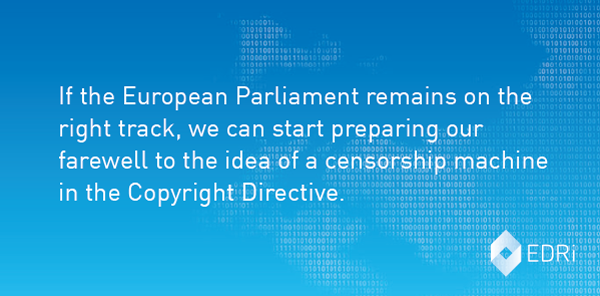Copyright Directive: Lead MEP partly deletes the “censorship machine”
Note: We have updated this article on 20 March 2017 eliminating mentions to the leak when it was no longer necessary and updating the number of amendments below. The rest of the analysis remains relevant and has not been modified.
On 8 March, we were able to gain an insight into a leaked Draft Report from the Legal Affairs Committee (JURI) of the European Parliament (EP) on the proposal for a Copyright Directive. On 17 March, the official text was published with some changes to the leak.
Member of the European Parliament (MEP) Therese Comodini Cachia, the Rapporteur for JURI on this file, has proposed a number of changes to the original broken and extreme proposal of the European Commission (EC). Ms Comodini has taken a reasonable approach and has amended the worst sections of the proposal: the “censorship machine” (aka upload filter) proposal in Article 13, and the suggestion to expand the “ancillary copyright ” (aka “link tax”) that failed in Germany and Spain and was planned to be expanded to the entire EU.
What does Ms Comodini make of the “censorship machine”?
As we described in a previous blogpost, the EC proposed a mandatory “censorship machine” to filter all uploads from every user in the EU. As this video describes, the proposal of the Commission would require private companies to police the internet, in direct contradiction to two separate European Court rulings. The proposal would eliminate our freedoms to remix, to parody and others, in explicit breach of the EU’s obligations contained in the Charter of Fundamental Rights of the EU. In the proposed amendments, Ms Comodini has deleted key aspects of the section of the draft Directive and amended the proposal in a way which would minimise the worst aspects of the censorship machine. Moreover, she has correctly restated the liability rules which exist in current EU legislation (the e-Commerce Directive). She advocates for the licensing agreements that were the ostensible goal of the European Commission in the first place.
Ms Comodini has also deleted the useless reference to the redress mechanism of the original proposal. She proposes a mechanism that allows users to communicate “rapidly and in an effective manner with the rightsholders” regarding the “measures” proposed in Art.13.1 (AM 59) that will ensure the functioning agreements concluded between rightsholders and Internet Service Providers (ISPs). This redresses the imbalance in the Commission’s proposal, which suggests that, first, rightsholders can demand that internet companies must delete certain content and secondly, that those internet companies should set up a complaint mechanism for customers who have been unfairly treated, as a result of the rightsholders’ decisions. A positive change is also AM 57, where Ms Comodini says that information about the “accuracy” of the measures employed is needed to “ensure the continued use of (…) exceptions and limitations, which are based on public interest concerns”.
We remain convinced, however, that Article 13 is fundamentally broken and its deletion is the preferred option. The alternative is for policy makers from different factions in the European Parliament to negotiate between various efforts to fix (or further break) the Commission’s text in order to reach a compromise.The 28 EU Member States would have to do the same thing in parallel, and then the Parliament and Member States could negotiate an agreement based on their respective negotiations. The broken Commission’s proposal simply does not merit this amount of work and the risk of an imperfect outcome that damages fundamental rights, innovation, and competition in Europe.
Is the mad idea of the “link tax” still on?
The proposal to expand the rights of publishers via the creation of an ancillary copyright has received such criticism that the Rapporteur of the EP Committee on Internal Market and Consumer Protection (IMCO), Catherine Stihler MEP had already asked for its deletion in her draft Opinion.
Instead of the full deletion of the article in question, Ms Comodini has tried to solve the enforcement problem, raised by press publishers. She proposes (in AM 52) the establishment of a presumption of representation for press publishers, related to “authors of literary works contained therein and the legal capacity to sue in their own name when defending the rights of such authors”. When explaining this amendment she rightly points out that “(w)ithin this context it is also important to consider that plurality of news and opinions and wide access to these news and opinions is important for public debate in a democratic society. Similarly, non-commercial sharing of such news or opinions is also important in modern democratic societies.
The approach of the two key MEPs, from the two largest political groups, puts the more extreme measures proposed by the Commission in doubt. If the EP remains on the right track, we can start preparing our farewell to the idea of a censorship machine in the Copyright Directive.

Copyright reform: Document pool
https://edri.org/copyright-reform-document-pool/
The copyright reform: A guide for the perplexed (02.11.2016)
https://edri.org/copyright-reform-guide-for-the-perplexed/
A positive step forward against the “censorship machine” in the Copyright Directive (28.02.2017)
https://edri.org/positive-step-forward-censorship-machine-copyright-directive/
Video: Stop #CensorshipMachine: EU #copyright threatens our freedoms (07.03.2017)
https://www.youtube.com/watch?v=qAcTeYtUzQY
Campaign: Save The Meme! By EDRi member Bits of Freedom
https://savethememe.net/

